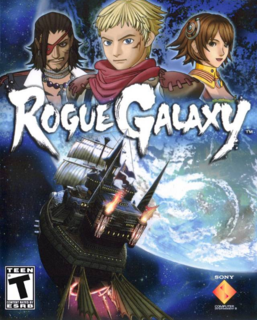In short: Rogue Galaxy is a game that’s built around a very interesting start-point, but quickly loses itself in the gig
Rogue Galaxy more or less follows the formula of the action-RPG genre: you level up your characters, gain experience and money to improve your status and equipment, but it’s up to you to walk over to the enemy and slash the hell out of him/her in real time battles. There are foes you can fight normally (which basically means: slash them compulsively so then can’t attack you), foes that can only be hit on the head (so you jump before slashing) and enemies that have barriers (which you have to break with special attacks before fighting normally). You are granted with a party of three members whose AI’s are fairly good to deal with the two first types of monster, but noticeably bad when dealing with the third. All in all, there’s little to no strategy on it, but that shouldn’t mean the battle system is boring. You can come across a distinct pleasure in Rogue Galaxy’s fights even tough they are generally very repetitive and predictable, it must be due to the fair amount of adrenaline and thrill present on them, as well as to the interesting and innovative level up arrangement, in which not only you, but your weapons gain experience and evolves. Of course, the game battles do not consist only of jumping and slashing: every character has their unique set of abilities and special attacks that they can use. While the animation of said attacks are generally good, the game offers you the option of skipping them, and you will find yourself using it quite often. The special attacks are somewhat the same. You have techniques that hit all the foes on the screen, abilities that enhance the damage caused by your weapon and abilities that cause status change (inflicting either positive status on you or negative status in your enemies). There is very little variation on them, and – even worse – the characters don’t seem to differ very much skill wise, so there’s barely any distinction in which party you choose to fight each battle. Your group members also have an attack called “Burning Strike” (which can be considered this game version of Final Fantasy’s “Limit Break”), in which the battle stops and you character performs a gorgeously animated super attack on your enemy, whilst you timely press buttons that appear on the screen in order to keep the attack going for as long as possible. Whereas a great addition, there are, on the other hand, two distinct problems with this resource. Firstly, pressing the buttons in time while the attack is going on will probably make less-then-slick players unable to sit back and enjoy the excellent animation of them, and secondly, the “Burning Strike” can’t be used against bosses, which is generally the moment when you would need them the most.
Rogue Galaxy is not a difficult game, tough it can be a bit tricky at times. You rely a whole lot on item usage here, in fact, they are the only healing resources available during battles, and you use them so much that the game offers you the option of putting that action on automatic mode, so you don’t need to stop what you are doing to access the menu all the time. Some of the enemies in the game can hit pretty hard, being capable of taking 2/3 of your health with a single blow. Considering this, it is imperative that you master the use of the blocking ability, especially against fast hitting foes, since this action cuts the damage of your enemy’s attacks by 80%. Every now and then you might have to face a unexpectedly strong boss, but the abundance of save points (which not only record your progress, but also heal you and serve as teleporters for other visited areas, meaning you can go right to the nearest shop and restock you item supply) prevent that experience from becoming frustrating. At the very least, Rogue Galaxy is an accessible game, with easy-to-pick-up gameplay and mild difficulty. The production is certainly the most satisfying aspect of this product. The in-game graphics are very nice, combining good textures, solid animations and lighting effects. The frame rate runs smoothly throughout 99% of the game and the loading times are short and only eventual, while the cell shaded, anime-like characters and environments work very well with the theme proposed and are handed beautifully. However, it’s on the animated sequences that the graphics really shine: they are downright stunning, displaying a graphical quality comparable to most animated movies and cartoons (oriental and occidental) of today, if not better. The sound is equally excellent. Rogue Galaxy presents not only a solid work of voice acting (which comes out surprisingly “uncheesy”) but also a beautiful music score, full of slow, emotive ballads and more ethnic flavored upbeat tunes. In particular, the acoustic guitar driven theme of the “Kuje Desert” stands out as one gorgeous piece of work. Rogue Galaxy is, in the effort of defining it with one word, disappointing. Not only the story get’s incomprehensively bad at a certain point, but the gameplay is not varied enough to keep the interest of the player fresh through the entire experience of playing it. Overall, it’s a pretty neat game to look at and listen to, but not to play for too long.

